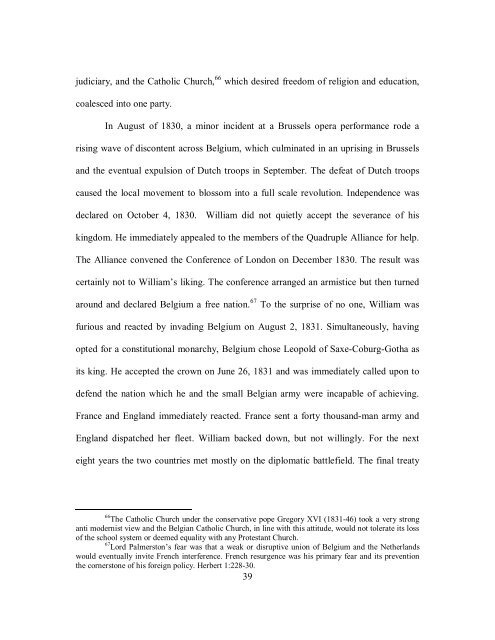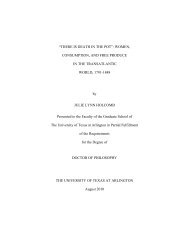EARLY BELGIAN COLONIAL EFFORTS - The University of Texas at ...
EARLY BELGIAN COLONIAL EFFORTS - The University of Texas at ...
EARLY BELGIAN COLONIAL EFFORTS - The University of Texas at ...
Create successful ePaper yourself
Turn your PDF publications into a flip-book with our unique Google optimized e-Paper software.
judiciary, and the C<strong>at</strong>holic Church, 66 which desired freedom <strong>of</strong> religion and educ<strong>at</strong>ion,<br />
coalesced into one party.<br />
In August <strong>of</strong> 1830, a minor incident <strong>at</strong> a Brussels opera performance rode a<br />
rising wave <strong>of</strong> discontent across Belgium, which culmin<strong>at</strong>ed in an uprising in Brussels<br />
and the eventual expulsion <strong>of</strong> Dutch troops in September. <strong>The</strong> defe<strong>at</strong> <strong>of</strong> Dutch troops<br />
caused the local movement to blossom into a full scale revolution. Independence was<br />
declared on October 4, 1830. William did not quietly accept the severance <strong>of</strong> his<br />
kingdom. He immedi<strong>at</strong>ely appealed to the members <strong>of</strong> the Quadruple Alliance for help.<br />
<strong>The</strong> Alliance convened the Conference <strong>of</strong> London on December 1830. <strong>The</strong> result was<br />
certainly not to William’s liking. <strong>The</strong> conference arranged an armistice but then turned<br />
around and declared Belgium a free n<strong>at</strong>ion. 67 To the surprise <strong>of</strong> no one, William was<br />
furious and reacted by invading Belgium on August 2, 1831. Simultaneously, having<br />
opted for a constitutional monarchy, Belgium chose Leopold <strong>of</strong> Saxe-Coburg-Gotha as<br />
its king. He accepted the crown on June 26, 1831 and was immedi<strong>at</strong>ely called upon to<br />
defend the n<strong>at</strong>ion which he and the small Belgian army were incapable <strong>of</strong> achieving.<br />
France and England immedi<strong>at</strong>ely reacted. France sent a forty thousand-man army and<br />
England disp<strong>at</strong>ched her fleet. William backed down, but not willingly. For the next<br />
eight years the two countries met mostly on the diplom<strong>at</strong>ic b<strong>at</strong>tlefield. <strong>The</strong> final tre<strong>at</strong>y<br />
66<br />
<strong>The</strong> C<strong>at</strong>holic Church under the conserv<strong>at</strong>ive pope Gregory XVI (1831-46) took a very strong<br />
anti modernist view and the Belgian C<strong>at</strong>holic Church, in line with this <strong>at</strong>titude, would not toler<strong>at</strong>e its loss<br />
<strong>of</strong> the school system or deemed equality with any Protestant Church.<br />
67<br />
Lord Palmerston’s fear was th<strong>at</strong> a weak or disruptive union <strong>of</strong> Belgium and the Netherlands<br />
would eventually invite French interference. French resurgence was his primary fear and its prevention<br />
the cornerstone <strong>of</strong> his foreign policy. Herbert 1:228-30.<br />
39
















